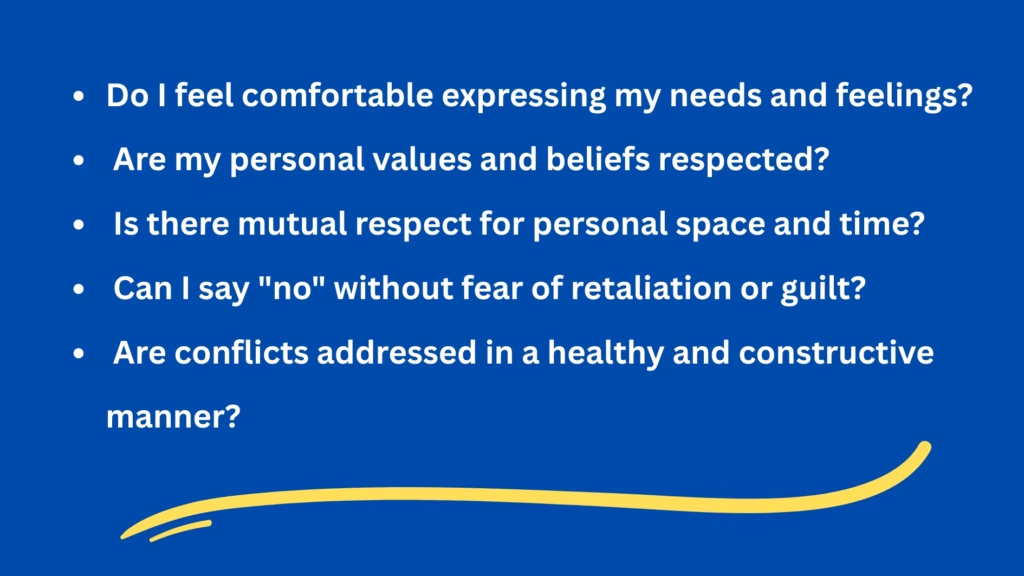Setting healthy boundaries in relationships is essential for fostering mutual respect, understanding, and lasting love. Without clear boundaries, relationships can become strained, leading to resentment and emotional exhaustion. By establishing and maintaining healthy boundaries, individuals can ensure their needs are met while respecting their partner’s needs, creating a balanced and fulfilling partnership.

Why Boundaries Matter: The Foundation of Respect and Trust
Boundaries are the invisible lines that define our personal space, needs, and expectations in a relationship. They help maintain individuality while fostering connection. According to Stanford University’s Student Affairs, boundaries help determine what is and is not okay in a relationship, whether that be with friends, partners, co-workers, bosses, or family members.
Without boundaries, individuals may feel overwhelmed, leading to stress and dissatisfaction. Conversely, healthy boundaries promote autonomy, reduce codependent habits, and set clear expectations when interacting with others.
Types of Boundaries in Relationships
Understanding the different types of boundaries can help individuals identify areas where they need to set limits:
-
Emotional Boundaries: Protecting your feelings and emotional well-being.
-
Physical Boundaries: Respecting personal space and physical needs.
-
Sexual Boundaries: Ensuring mutual consent and comfort in intimate situations.
-
Intellectual Boundaries: Respecting thoughts, ideas, and opinions.
-
Financial Boundaries: Managing money and financial responsibilities.
How to Establish Healthy Boundaries
Setting boundaries involves self-awareness, communication, and consistency. Here’s how to establish them:
1. Self-Reflection
Identify your needs, values, and limits. Reflect on past experiences where boundaries were crossed and how it made you feel.
2. Open Communication
Discuss your boundaries with your partner honestly and respectfully. Use “I” statements to express your needs without blaming.
3. Consistency
Maintain your boundaries consistently. If a boundary is crossed, address it promptly to reinforce its importance.
4. Flexibility
Be open to revisiting and adjusting boundaries as the relationship evolves. Flexibility ensures that boundaries remain relevant and effective.
Consider a scenario where one partner frequently brings work stress home, impacting their time together. By setting a boundary to avoid work discussions during dinner, they create a space to connect without external pressures. This boundary fosters quality time and strengthens their bond.
Expert Insight: The Importance of Boundaries
Nedra Glover Tawwab, a licensed therapist and author, emphasizes that boundaries are essential for healthy relationships. In her interview with MindTools, she explains that boundaries help individuals maintain their identity and prevent resentment.
Research Findings: Boundaries and Relationship Satisfaction
A study published in the Journal of Social and Personal Relationships found that individuals who set clear boundaries experience higher relationship satisfaction. The research highlights that boundaries contribute to mutual respect and understanding, essential components of a healthy partnership.
Comparison Table: Healthy vs. Unhealthy Boundaries
| Aspect | Healthy Boundaries | Unhealthy Boundaries |
|---|---|---|
| Communication | Open and honest | Avoidant or aggressive |
| Respect for Autonomy | Encourages individuality | Demands conformity |
| Emotional Expression | Allows for sharing feelings safely | Suppresses emotions or invalidates feelings |
| Conflict Resolution | Addresses issues constructively | Avoids or escalates conflicts |
| Personal Space | Respected and valued | Ignored or violated |
Checklist: Assessing Your Relationship Boundaries
Use this checklist to evaluate the boundaries in your relationship:
FAQs : Healthy Boundaries in Relationships
Q1.What are healthy boundaries in relationships?
Healthy boundaries are guidelines that individuals set to define acceptable behaviors and interactions in a relationship, ensuring mutual respect and understanding.
Q2.Why are boundaries important in relationships?
Boundaries help maintain individuality, prevent resentment, and promote mutual respect, leading to healthier and more satisfying relationships.
Q3.How can I communicate my boundaries effectively?
Use clear and respectful language, employ “I” statements, and express your needs without blaming or criticizing your partner.
Q4.What if my partner doesn’t respect my boundaries?
Address the issue calmly and assertively. If the behavior continues, consider seeking professional help or reevaluating the relationship.
Q5.Can boundaries change over time?
Yes, boundaries can evolve as individuals and relationships grow. Regularly reassess and adjust boundaries to ensure they remain effective.
Q6.Are boundaries the same as rules?
No, boundaries are personal limits set to protect well-being, while rules are often imposed and may not consider individual needs.
Q7.Is it selfish to set boundaries?
No, setting boundaries is a form of self-care and is essential for healthy relationships.PositivePsychology.com
Q8.How do I know if my boundaries are too rigid?
If your boundaries prevent connection or intimacy, they may be too rigid. Balance is key to maintaining healthy relationships.
Q9.Can setting boundaries improve communication?
Yes, boundaries encourage open and honest communication, fostering a deeper understanding between partners.
Q10.Should boundaries be discussed early in a relationship?
Yes, discussing boundaries early helps establish mutual expectations and prevents misunderstandings.
Conclusion
Setting healthy boundaries in relationships is crucial for fostering respect, understanding, and lasting love. By identifying personal needs, communicating openly, and maintaining flexibility, individuals can create balanced and fulfilling partnerships. Remember, boundaries are not barriers but bridges to deeper connection and mutual growth.
Special Advice
Start by setting small boundaries and gradually build up. Practice self-awareness and self-compassion, and don’t hesitate to seek support from trusted friends, family, or professionals when needed.
Call to Action
Ready to strengthen your relationship? Begin by reflecting on your personal boundaries and discussing them with your partner. For more insights and resources, explore our related articles and tools.
Useful Articles :-
- Signs of Love Bombing: 7 Red Flags to Spot Manipulative Affection Early
- What Is a Situationship? 7 Unfiltered Truths About Modern Love
- 10 Signs of a Healthy Relationship: What To Look For
- Communication Skills for Couples: 7 Transformative Tips to Strengthen Your Connection
- 7 Powerful Ways to Build Healthy Relationship Boundaries for Lasting Love
- 9 Empowering Steps for Recovering from a Breakup: Heal, Grow, and Thrive
- 7 Powerful Long-Distance Relationship Advice : Tips to Keep the Spark Alive
- Jealousy in Relationships: 7 Powerful Ways to Manage the Green-Eyed Monster
- 5 Insights Into Love Languages in Relationships : Do They Really Work?
- What Does Emotional Safety In Relationships? 7 Biblical Keys to Building Trust and Intimacy